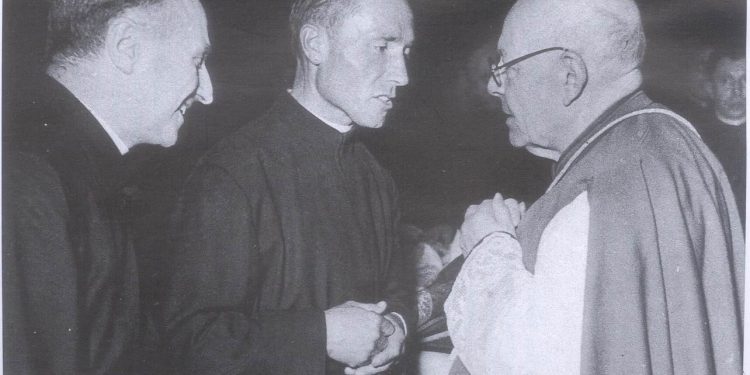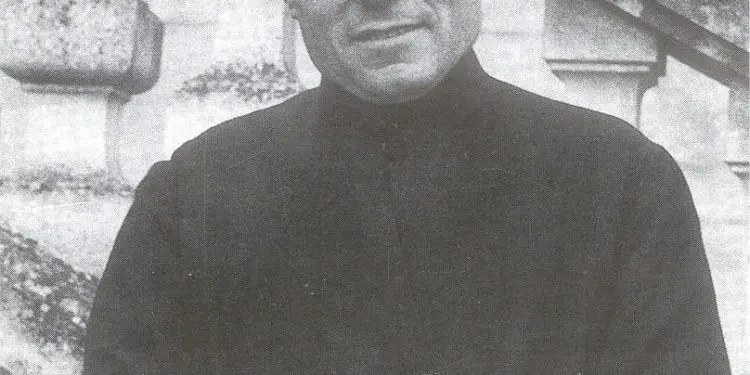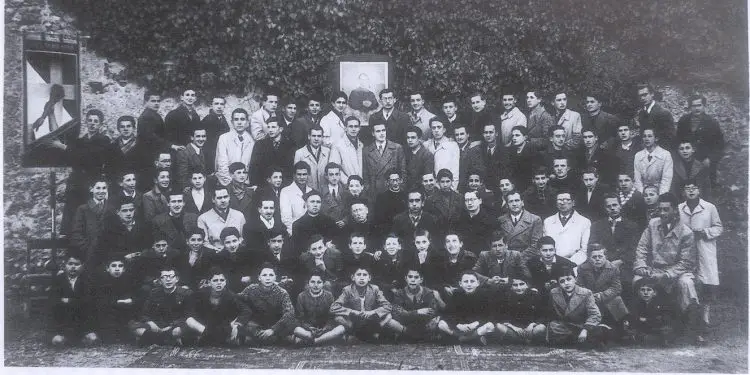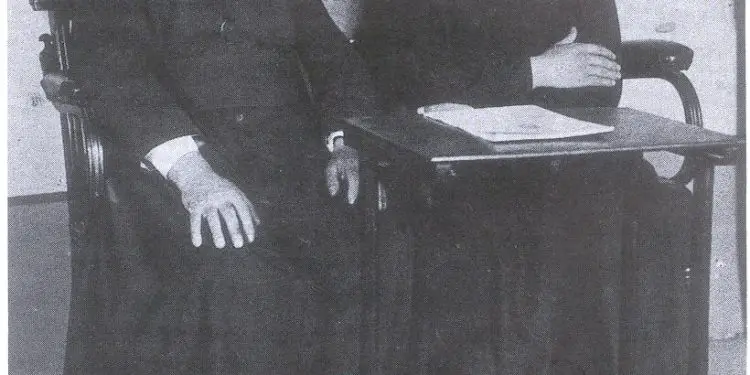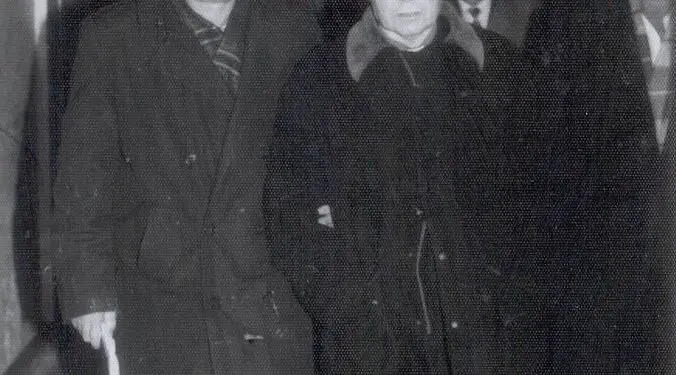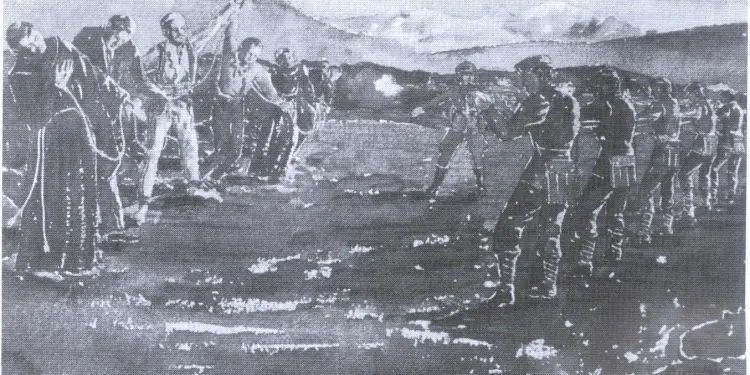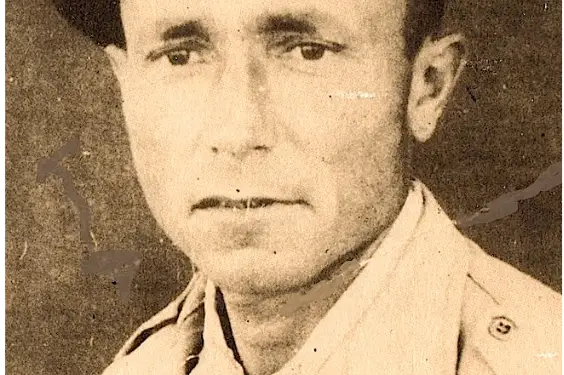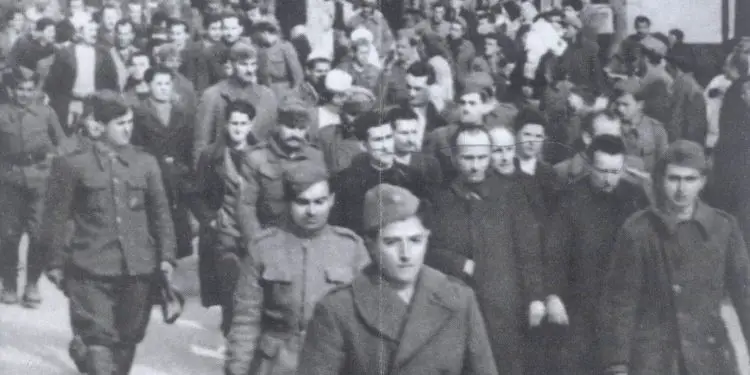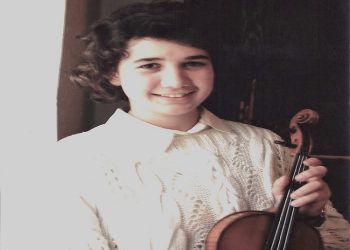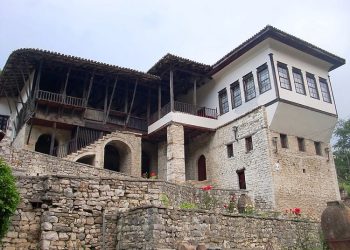Dashnor Kaloçi
Memorie.al the unknown testimonies of Father Jak Gardin, the Italian clergyman who came to Albania in the 1930s serving as a priest in some of the parishes of the Northern Highlands, and a lecturer at the College of Jesuit Frents in the city of Shkodra. The whole story from his arrest by the communists in 1945, the sentence of 10 years in prison on charges of “Vatican agent”, the ordeal in camps and prisons, repatriation to Italy in 1956 after the Khrushchev-Adenauer agreement, published in Rome in 1992 of the memoir, “Ten years in prison in Albania 1945-1955”, until his arrival in Albania after the ’90s….
One of those foreign nationals who suffered for a long time in the prisons of Enver Hoxha’s communist regime was the Italian Catholic clergyman, Father Jak Gardini, who had come to Albania since the 1930s to serve as a parish priest in several from the remote areas of the Northern Highlands and as a lecturer at Jesus College in the city of Shkodra. But his dream of continuing his devotional service to Albania’s Catholic faithful was cut short in 1945, when he was arrested by the new communists in power. Following allegations made as “Vatican agent”, Father Jak Gardini was sentenced to ten years in prison, which he suffered in forced labor camps in several districts of communist Albania. He could only be released from prison in 1955, and that same year he was repatriated to his native Italy. In the early 1980s, Father Jak Gardini wrote memoirs of his life during his time in Albania, as well as serving his sentence, summarizing them in a book entitled “Ten years in prison in Albania” (1945-1955) which was published in Rome on May 24, 1986. From that book by Gardiner, we have selected only a few parts, which we are publishing without any changes, presenting them in the Gheg dialect, as he himself wrote them. author.
follows from the previous number
Shooting of Dom Zadeja, Shantoja, Arab and Track
With arrest and imprisonment, my case can be called complete. But I am not the only one who falls carelessly into the trap of “the power of the people.” I belong to a large community that supported large groups of institutes. The Jesuit Society then ran the Papnuer Seminary, the Saverjan College, the orphanage, and the printing press with two magazines; a group of Jesuits during the winter cared for the spiritual good of the mountaineers, reconciled bloodshed or revenge, then led a series of Catholic Action activists. The mission of the Jesuits in Albania summed up a well-organized complex that is not without reason held as a vanguard of Christianity in a predominantly Muslim country. According to the mentality of the people of the new regime, the headquarters of the various works of the Jesuits was a long arm of the Vatican, a castle seen with suspicion and even fear. Since the partisan liberation troops had replaced the German ones (November 1944), Mission’s actions were the cause of racial investigations, more than once during the checks everything was turned upside down and carefully examined that they were not finding any sufficient reason to set fire to a qi attack that would lead to everything. In the centuries of their history against the Jesuits, there has never been a lack of slander, even insults, prejudices, and Albania were no exception: rumors circulated even before; but among the years we are talking about, there was also some espionage or betrayal of “friends”. Yet nothing concrete or real had come to light.
Advice from Father John Faust
After my arrest and prison sentence, the community lived as if breathless and with the premonition of the approach of a storm. All the college youth were affected. Father Gjon Fausti, who had the duty of vice-provincial, when I told him what had happened at the famous conference, said to me: “You should have been more prudent! But you are only the first, our hour will not be late. We are in the hands of God!” Before and after my sentence, a colleague would come to visit me in prison, but the conversation always takes place in the presence of a guard ready to dictate any sheikh or expression that could get on our necks. Because of the circumstances, my race had not confused my other cousin or Catholic entity. For now, I was just an unsuspecting subject over whom power could have exercised some justification. This can be called a small thing, but always a first step that could later lead me to the desired goal. In prison I was, of course, completely unaware of what was happening to my fellow Jesuits. Towards the middle of December 1945, I flew from the lips of the same person who had come to visit me: “Jacques arrested!” I was left as if I had confessed and we were overwhelmed with grief, because those words, as soon as they were whispered, left me with many things to understand. Tue put himself in danger, the sub-provincial Father Fausti came to visit me for Christmas. In that case, he confirmed the news, and they gave him a look on his face: “In the hands of God.” That was the last time I saw him and spoke to him. In December, elections were scheduled for the creation of the Popular Front. In the city, the opposition forces of the regime had secretly decided to inform the population about the view that the vote had, its rank and the consequences that could occur. It seemed that until that moment the power was in the hands of the liberation troops, formed with elements of every religious and political faith, who had joined together to expel the invaders of the country. In fact, the Armed Forces were controlled by the communists, and the elections were intended only to give some legal perspective to those who had taken power and wanted to preserve it only for themselves. It is so true that when, later, he tried to organize the leading cadres, the craftsmen of the centurion, who with every right wished for a coalition government, at least with the socialists, were silenced and then suppressed. It is well known that in this climate those elections could not take place in a truly free way. The seizure of typographies, cyclostyles, paper stocks, typewriters, and everything that can be used as a propaganda tool has long been planned. Even in the house of the Jesuits all such tools were seized.
Dropping anti-communist tracts
However, some seminarians had managed to find, in the greatest secrecy, some parts of an old cyclostyle and make it work in some way. Unbeknownst to the superiors, he agreed with some elements of the city, with that initial gadget, at night, they multiplied the leaflets and spread them a little everywhere. Qi police did not sleep, stopped a boy in charge of dispersal and beat him, duel to find out the origin of those sheets. So, they got to the jackets of our workshop. Four were arrested. Tue was subjected to various tortures, the police intended to force them to claim that the organizers of that anti-government conspiracy were the superiors of the Jesuits. But, despite the coercion, the promises, the torture, the seminarians remained steadfast in claiming that the answer was entirely theirs. Despite this, both ethnic groups, Fausti and Dajani, were arrested in the same way. Subject to abuse, for the entire month of calendula and horror they remained locked up among the toilet’s granule with dirt, without ever confronting the seminarians. No voice, not even from the party friends, who were in favor of the fathers, was heard. Lawyer Dhimitër, who was kept as the best Albanian lawyer, tried to defend them by emphasizing: “You will only make them martyrs if you punish them”, but he was whistled. Everything was fabricated, and in court the prosecutor demanded the death sentence for the seminarians and life imprisonment for both ethnicities. This decision was changed by the high court that eight days ago decreed: the death penalty for two ethnicities and one seminarian, life imprisonment for the others. For six days in a row, the defendants were tied up two by two and with Father Faust only at the top, they went to court and marched between two sides of the people who shouted: He walked as clear as a “desolate Christ.” On the morning of the shooting, when he came out of the cell with a candlelight and during the passage, it was he, the “leader of the gang”, who addressed words of consolation to his comrades for forgiveness and hope for all: “We are going to the house of God!”. I believe and it comes to my mind: it was March 4, 1946. At dawn a terrible machine gun crisis was heard. The bodies were dumped in a common grave behind the walls of the Catholic cemetery of Shkodra. Towards the same hour of that morning, the door of the cave where I was with the other priest, opened and in the wave of light I entered the familiar faces of the three seminarians who had remained alive. They breathed a sigh of relief: “We have destroyed everything!” With the shooting of the fathers Fausti and Dajani, the work of the Jesuits in Albania, patiently built throughout the last century, took the devastating blow. It was no wonder that, albeit in general and miserable contradiction, and still in the absence of some branches, yet the ever-constructive construction in which the work of the Jesuits had taken place with the perseverance of the people settled strong and lively, could give the impression. of a “castle”. On the contrary, the new invaders, with very few exceptions, had an almost limited culture. Such antagonism could undoubtedly cause a strong sense of fear. It was quite logical that from the beginning he would think seriously about the disappearance of this castle. And now the “castle” can be called occupied: various suspended activities, schools closed, tools such as typography, library, museum and state physics laboratory, seminarians sent to their homes, Albanian Jesuits scattered and Italians repatriated. It was a really perfect operation in a decisive way.
Execution of famous clerics
The Albanian Communist Party was well aware that there could be no agreement between the doctrinal positions of the Church and its own. On the other hand, in those beginnings, before they put the whole situation in their hands, a face-to-face attack was not appropriate. It could not be left behind that a good number of Catholics, intentionally or unintentionally, were now enlisted in the regular army. Then the mountainous area, starting from Lake Shkodra on a line that reached the borders of Dibra, almost a third of Albanian, was mostly inhabited by Catholics, and still not well controlled by government forces. From one moment to the next, this area could become an opposing center. Hence the widespread proclamations in the country by the central authorities still ensured the freedom of religion. The proclamations also stressed that “traitors and enemies of the people” should be wary of “popular justice”. But who were they that? In what sense and why were they called that? Words about people started circulating to put us on a list of “disappeared” and now to be shot. In Shkodra, almost on the border with Yugoslavia, immediately after the entry of partisan troops, there was talk of the arrest of several priests and mass shootings. “They were traitors,” but on the other hand they were told that he did not want to attack the Church in any way. Thus, Dom Lazër Shantoja, Dom Ndre Zadeja, Dom Alfons Tracki, Dom Nikolë Gazulli, Dom Pjetër Çuni and some Franciscans disappeared. It seems that the authorities of the Catholic Church were torn apart by the Communist Government, but in reality, nothing was done. An impartial response from the Church that probably sounded like a “no” to direct cooperation – was it interpreted as a sign of hostility? I cannot say for sure, but in fact the storm that had been going on for a long time became dense and ended up exploding wildly like a duh. Now, between the end of 1945 and the end of March 1946, the Jesuits and their works were destroyed, as I have shown above. In May of the same year 1946, the archbishop of the metropolis of Shkodra, Monsignor Gaspër Thaçi, suppressed them from the events. Thus, the Church of Albania lost one of the most perfect shepherds. The Apostolic Delegate, Monsignor Giovanni B. Nigris, after his return from a trip to Rome declared himself an “undesirable person” and was deported. The Archbishop of Durrës, the Franciscan Monsignor Vinçenc Prenushi, Mecca in the prisons of his city where he died in 1949. The Bishop of Pult, the Franciscan Monsignor Bernardin Shllaku, was imprisoned in Shkodra with the ordinary convicts, because some people were found in his house corn “outlaws.” From the Albanian Church, now crumbling, there were still two elements to be demolished until its complete disappearance: the community of the Franciscans with the works directed by them and the remaining units of the bishop composed by Monsignor Frano Gjini, Bishop of Lezha and Monsignor Gjergj Volaj, Bishop of Sapa in Zadrima. Therefore, the efforts of the Tirana government were focused against these objectives. In early 1947, the Franciscan provincial, Father Mati Prendushi, and the assembly guard, Father Çiprian Nika, were arrested and then shot. They were the claim that they had enough weapons hidden in their assembly of Gjuhadol, qi was the mother house of the Franciscans. The heirs of the Order were confiscated. It will later be learned that the weapons, due to which they were shot, were fired at the assembly by the police agents themselves during a search. This would be stated before the court by an agent who had lost the trust of the party. This was Pjerin Kqira and for that statement he had to face the death penalty. In the same year 1947, near Easter, after incredible tortures, the two bishops who had remained together with Dom Nikolle Deda were sentenced to death and shot. And the list could be tragically extended to the diocesan priest and nuns I knew personally, who were shot or died under torture, or as a result of torture. We were about twenty priests in the old prison of Shkodra and we had plenty of time to put together lists of names and bits of information. We kept long and small accounts about those who must have died and those who could die from one moment to the next./Memorie.al




